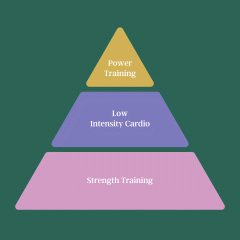The average American drinks three cups of coffee per day. If you’re anything like me, that morning (and afternoon) pick-me-up is a lot like an “on button” for your brain. Maybe you’re more of a tea person. Either way, a caffeine jolt can certainly help you stay alert, and some studies even link coffee consumption to improved health outcomes.
But if your goal is to improve your work performance, there are better ways to stay sharp than simply brewing a fourth cup of your drink. Adopting long-term strategies for a more focused, alert brain can equip you to be more effective and productive on the job and in life.
You’re not sure where to begin? Here are 7 science-backed tips to flip your “on” switch at work and stay sharp—and keep it that way.
1. Allow Your Mind to Wander
Staying focused is essential for getting work done and doing it well. So, why would you allow your mind to wander?
As counterproductive as it sounds, occasionally letting yourself get off track can actually improve alertness and, as a result, productivity.
All tasks require brainpower, but full-blown concentration takes up a lot of headspace. If you’re always focusing on just one task, your brain will have to work harder to resist thinking about (and doing) other things. As a result, your mind may grow fatigued, which will result in declining focus and productivity.
Before you start planning what’s for dinner tonight, consider this caveat. Psychology researchers say that while intentional, planned mind-wandering can improve the ability to stay alert, accidental daydreaming can have the opposite effect.
So, the best way to leverage a wandering mind is to use it as a strategic tool. For example, if you’re struggling to stay focused, take a break to do another problem-solving task, then go back to your original project. Along with gaining a fresh perspective on the task at hand, you’ll also free up mental space by checking a separate item off your to-do list.
2. Stop for a Break
Breaks don’t always come naturally to me, especially if I’m buried in work. (Ask my wife, who’s been known to tantalize me away from my desk with a delicious meal.) The problem is, working for a long time without stopping isn’t always as productive as it sounds. Your brain needs the occasional break to stay sharp.
That doesn’t mean, of course, that you can sneak away from the office any time the desire strikes you. What it means is that being intentional about when and how you take breaks can drastically improve your alertness and focus.
Studies show that alertness occurs in cycles, and most people can’t concentrate for longer than 90-minute increments without requiring a 15-minute break. Scientists agree that the key to a focus-inducing break is to totally distract your mind from what you were doing before.
Instead of pivoting to another work task or even scrolling through your emails, do a puzzle, take a walk outside, or hop on a phone call with a friend.
3. Train Your Brain
The good news about your brain: It’s malleable. If something doesn’t come naturally, including focus and alertness, you can train yourself.
Focusing on cognition-enhancing activities (translation: playing games that require strategic thinking) is one way to do that. According to one 2015 study, adults who spend 15 minutes a day, five days a week, on brain-training activities such as crossword puzzles experienced improved concentration.
Practicing mindfulness and meditation is another way to train your brain to focus. While scientific research confirms it comes with a slew of health benefits, a 2011 review suggests mindfulness can improve attention, focus, and memory.
If getting away with a yoga mat for full-blown meditation practice isn’t realistic, start small. I like to take a few deep breaths at my desk while I focus on the sensations in my body. You could also simply notice your surroundings with all five of your senses—smell, touch, sight, and so on. Even micro-mindfulness exercises like these can equip your brain to keep your brain alert and focused when it matters most.
4. Get Some Exercise
Your brain and body are intimately connected, which means that what you do physically has a direct effect on how you feel mentally. Routine exercise—even going for a brisk walk or practicing yoga a few times a week—is a fast and simple way to improve your brain function so you can stay sharp at work.
Research consistently shows people who exercise routinely and are more physically fit are also more effective at completing cognitive tasks that require sustained attention. Another study found that older adults who exercised more than 75 minutes per week had better attention spans and abilities to focus.
But those aren’t the only ways exercise equips your brain for productivity. The endorphins released when you work out can also help you get better at controlling your impulses, which in turn can help you block out distractions. You’ll also notice that staying active boosts your overall physical energy levels, so you can dodge falling asleep at your desk.
5. Declutter Your Office Space
If I’m having a tough time staying engaged and on a task at work, one of the first things I do is look around me. More often than not, the cluttered state of my desk and office directly reflects the cluttered state of mind.
A few minutes spent tidying up your surroundings could make a big impact on your cognitive abilities, according to scientific research. One group of researchers found that having too much clutter in one’s environment actually decreases the brain’s capacity to focus and process information by creating an additional distraction.
Next time you catch yourself fighting to focus, consider your immediate surroundings. Don’t worry—you don’t have to overhaul your entire office. Instead, equip your brain to stay on task by minimizing visible clutter. You might be surprised about the impact of spending 10 minutes cleaning up!
6. Improve Your Sleep
A poor night’s sleep is a surefire way to sabotage your alertness, no matter how many cups of coffee you consume. According to one study, even one night of sleep deprivation can interfere with self-control and attentiveness.
Cutting out of work early to get some rest might not feel productive to you, but ensuring you get ample sleep will only benefit your brain and work in the long-run. Remember that a well-rested body is a well-rested brain. So, if you want to stay sharp on the job, don’t burn yourself out logging hours that interfere with your ability to rest.
If a full eight hours simply isn’t possible, sleep for a bit during the day. Studies show short power naps can improve focus and energy, which contribute to your ability to stay sharp.
7. Don’t Rush
We’re all guilty of powering through our piles of work, myself included. But if you have a lot on your plate, rushing through your to-do list won’t do you any favors. To effectively work through everything that needs to get done, be as deliberate and slow as you can. Not only will you save time on cleaning up mistakes, but you’ll also sustain your ability to stay focused.
The scientific case for slowing down traces back to basic neuroscience. Our brains have two systems for thinking: an automatic and fast one, along with a slower, more logical system. As you can imagine, the faster way is linked with a more anxious state.
That’s not necessarily a bad thing. It’s adaptive to be frantic when you’re being chased down by a saber tooth tiger, but hurrying away from your predator also compromises your ability to focus.
On the other hand, slowing yourself down activates your parasympathetic nervous system, which alleviates those anxious feelings and turns on the logical part of your brain. So, you’ll not only be able to focus on the task at hand when you intentionally slow your mind and body down, but you’ll do a better job at coming up with creative ideas and solving problems, too.
Final Thoughts
If you’re struggling to stay sharp, alert and focused, don’t be discouraged—even the most productive people find themselves in a rut from time to time.
The important thing is to catch yourself veering off track so you can intervene as early and effectively as possible. By implementing science-backed strategies to stay sharp, you’ll not only become more effective in your work, but you’ll also reap mental and physical benefits that could improve your entire life.
More Tips on How to Stay Sharp and Focused
Featured photo credit: Battlecreek Coffee Roasters via unsplash.com





























































